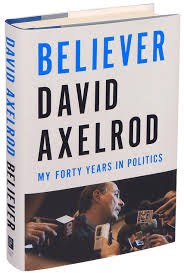By Mark Rosenberg
If you are reading the Tenth News, chances are that you are deeply interested in politics. The political atmosphere here in Illinois is precisely what drew David Axelrod from Brooklyn, New York, to attend college at the University of Chicago and remain here after he graduated. From a serendipitous start in journalism at the Hyde Park Herald, followed by a stint as a political beat reporter at the Chicago Tribune, Axelrod quickly grew attached to Chicago politics, waiting for the chance to jump to “the big one,” a presidential campaign. Family commitments led him to miss out on the Al Gore campaign of 2000, so he attached his career to that of a young black state senator from the south side of Chicago named Barack Obama. That began what Axelrod called “an improbable journey” for both men.
The title of Believer refers to Axelrod’s insistence on working only for candidates whose political philosophy matches his own personal convictions. Personal convictions led Axelrod to reject working for Rod Blagojevich’s gubernatorial campaign. As Axelrod tells it, when he asked Blagojevich why he wanted to run for Governor of Illinois, the candidate responded, “You can help me figure that out.” Axelrod then said, “If you can’t tell me why you are running, I can’t help you explain it to others.”
refers to Axelrod’s insistence on working only for candidates whose political philosophy matches his own personal convictions. Personal convictions led Axelrod to reject working for Rod Blagojevich’s gubernatorial campaign. As Axelrod tells it, when he asked Blagojevich why he wanted to run for Governor of Illinois, the candidate responded, “You can help me figure that out.” Axelrod then said, “If you can’t tell me why you are running, I can’t help you explain it to others.”
We all know what kind of convictions ended Blagojevich’s political career.
Filled with anecdotes like how Axelrod noshed his way to a weight gain of 25 pounds during the 2008 campaign, and honest self-assessments of his missteps along the way, the book is a story of how two individuals crafted a message and a relationship. Axelrod is unrelenting in his admiration of the sincerity and honesty of Barack Obama, as reflected in this quote, “He was an incomparable client—not perfect by a long shot; but brilliant and honorable and motivated by the best intentions; a good friend and fellow idealist. I had been spoiled.”
Nearly half of the book is a description of the relationship between David Axelrod and Barack Obama, from Obama’s 2004 Senate campaign through the West Wing years that Axelrod spent as advisor to the President, helping him craft his message. As expected, much of that period contains the rich anecdotes of Axelrod’s contacts with the White House team, especially the frequent encounters with Rahm Emanuel, Chief of Staff, and presidential advisor Valerie Jarrett, whose role often led to head-butting between the two of them.
His language may be crude at times, but David Axelrod documents the sacrifices he made as his family with a special needs child survived the long campaign absences. One significant flaw in the book, to my mind, is how generous Axelrod is with his assessment of client Richard M. Daley’s accomplishments as Mayor of Chicago, glossing over the state of the city’s finances following his term.
In an era of gridlock politics, it is refreshing to reflect on the career of a campaign maestro like David Axelrod and to see that there are some whose idealism drives their careers. In Axelrod’s words, “After a lifetime of rough and tumble, I still believed: in politics as a calling; in campaigns as an opportunity to forge the future we imagine; in government as an instrument for that progress.”
Believer by David Axelrod: A Story of Politics as a Calling
